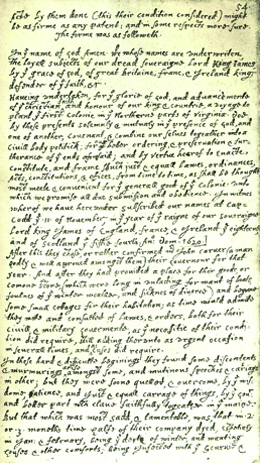| << Chapter < Page | Chapter >> Page > |
The first group of Puritans to make their way across the Atlantic was a small contingent known as the Pilgrims. Unlike other Puritans, they insisted on a complete separation from the Church of England and had first migrated to the Dutch Republic seeking religious freedom. Although they found they could worship without hindrance there, they grew concerned that they were losing their Englishness as they saw their children begin to learn the Dutch language and adopt Dutch ways. In addition, the English Pilgrims (and others in Europe) feared another attack on the Dutch Republic by Catholic Spain. Therefore, in 1620, they moved on to found the Plymouth Colony in present-day Massachusetts. The governor of Plymouth, William Bradford, was a Separatist, a proponent of complete separation from the English state church. Bradford and the other Pilgrim Separatists represented a major challenge to the prevailing vision of a unified English national church and empire. On board the Mayflower , which was bound for Virginia but landed on the tip of Cape Cod, Bradford and forty other adult men signed the Mayflower Compact ( [link] ), which presented a religious (rather than an economic) rationale for colonization. The compact expressed a community ideal of working together. When a larger exodus of Puritans established the Massachusetts Bay Colony in the 1630s, the Pilgrims at Plymouth welcomed them and the two colonies cooperated with each other.
The Mayflower Compact, which forty-one Pilgrim men signed on board the Mayflower in Plymouth Harbor, has been called the first American governing document, predating the U.S. Constitution by over 150 years. But was the Mayflower Compact a constitution? How much authority did it convey, and to whom?

In the name of God, Amen. We, whose names are underwritten, the loyal subjects of our dread Sovereign Lord King James, by the Grace of God, of Great Britain, France, and Ireland, King, defender of the Faith, etc.
Having undertaken, for the Glory of God, and advancements of the Christian faith and honor of our King and Country, a voyage to plant the first colony in the Northern parts of Virginia, do by these presents, solemnly and mutually, in the presence of God, and one another, covenant and combine ourselves together into a civil body politic; for our better ordering, and preservation and furtherance of the ends aforesaid; and by virtue hereof to enact, constitute, and frame, such just and equal laws, ordinances, acts, constitutions, and offices, from time to time, as shall be thought most meet and convenient for the general good of the colony; unto which we promise all due submission and obedience.
In witness whereof we have hereunto subscribed our names at Cape Cod the 11th of November, in the year of the reign of our Sovereign Lord King James, of England, France, and Ireland, the eighteenth, and of Scotland the fifty-fourth, 1620

Notification Switch
Would you like to follow the 'U.s. history' conversation and receive update notifications?